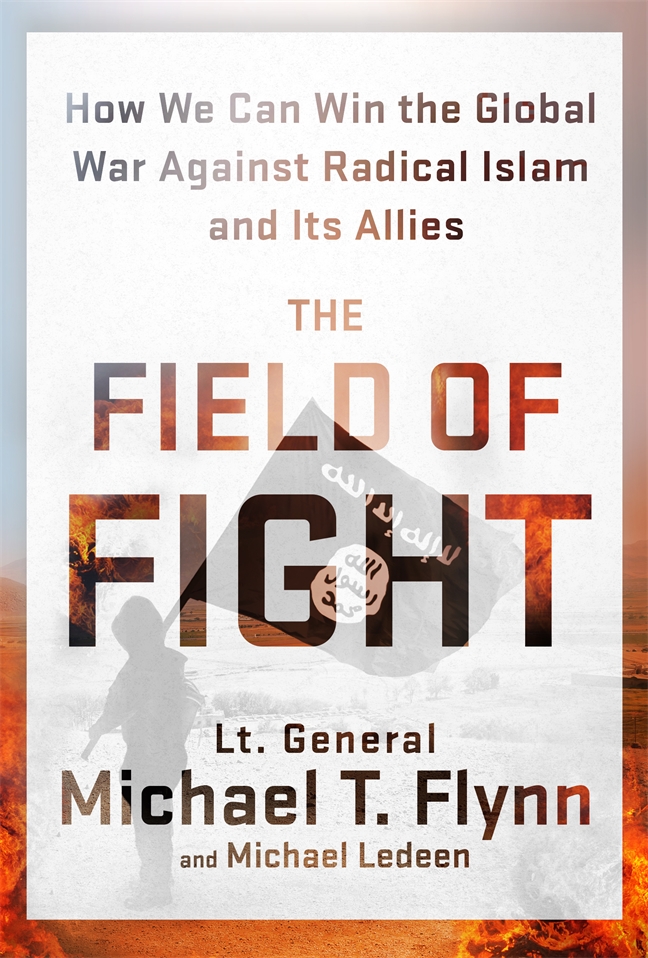
Flynn, a former U.S. Army lieutenant general and founder of Flynn Intel Group consulting firm and Leeden, scholar at the Foundation for Defense of Democracies, are the authors of The Field of Fight
What does “winning” mean and how do we accomplish this against radical Islamists and their allies? It means several things:
It won’t be easy—they’re a formidable enemy—and it certainly won’t be fast. Indeed, it is impossible with our current leaders, who clearly lack the will and the desire to win.
On the other hand, we know how to win this war. We’ve done it before, notably in the World War II and then the Cold War against the messianic mass movements of the 20th Century, Nazism, Fascism and Communism. Even in the Middle East since 9/11, we’ve won many battles. In fact, no matter what you’ve been told about the “lost wars” in Iraq and Afghanistan, we’ve defeated the radical Islamists every time we’ve fought them seriously. Their current positions of strength were not won against us on the battlefield, but were instead the result of our bad, politically motivated decisions, to withdraw before victory was consolidated.
The primary requirement for winning any war is the willingness, determination and resolve to win and to do the necessary things required for victory. At the moment we have a president who said—incredibly, in my opinion—on Nov. 16, 2015: “What I’m not interested in doing is posing or pursuing some notion of ‘American leadership’ or ‘America winning.”’
That says to the American people and to our enemies that America will not lead, does not want to win, and is therefore doomed to lose. Our enemies are certainly determined to lead and to win, whether they are radical Muslims or ambitious secular tyrants.
There is no escape from this war. Our enemies will not permit that. We will either win or lose, and at present we look like losers. Knowing the current administration will not challenge them, our enemies will press hard to gain every possible advantage before a new president, potentially with the will to win, takes office.
When these leaders are elected, how should they proceed? I offer the following four strategic objectives:
1. We have to energize every element of national power in a cohesive synchronized manner—similar to the effort during World War II or the Cold War—to effectively resource what will likely be a multi-generational struggle.
One leader must be overall in charge and totally accountable to the President—if they do not meet the test, which is to win, then fire them and find others who can. We have to stop participating in this never-ending conflict and win! And we MUST accept, there is no cheap way to win this fight. The bottom line is that we have to organize ourselves first before we can expect any international coalition to seriously join forces with the United States to destroy this evil we must clearly define as radical Islamism.
2. We must engage the violent Islamists wherever they are, drive them from their safe havens and kill them or capture them.
There can be no quarter and no accommodation. Any nation-state that offers safe haven to our enemies must be given one choice—to eliminate them or be prepared for those contributing nations involved in this endeavor to do so. We do need to recognize there are nations who lack the capability to defeat this threat and will likely require help to do so inside of their own internationally recognized boundaries. We must be prepared to assist those nations.
3. We must decisively confront the state and non-state supporters and enablers of this violent Islamist ideology and compel them to end their support to our enemies or be prepared to remove their capacity to do so.
Many of these are currently considered “partners” of the United States. This must change. If our so-called partners do not act in accordance with internationally accepted norms and behaviors or international law, the United States must be prepared to cut off or severely curtail economic, military and diplomatic ties.
4. We must wage ideological war against radical Islam and its supporters.
When most people talk about “war,” they think of tanks driving across the desert, planes dropping bombs, ships clashing at sea, and soldiers going toe to toe against each other. But at least as important, people need to recognize the strategic power of words and pictures. Our enemies certainly do; they recruit followers and inspire terrorists using words via social media on forums such as Facebook and Twitter, sending their messages of hate across the Internet, which they also use to communicate with their legions of followers, including “sleepers” in our country. Ideas, and the words that express them, are very much a part of war, but we have deliberately deprived ourselves of using them.
We’ve fought radical ideologies in the past and won. Had we lost to the Nazis in World War II, much of the world would be praying at the altar of Adolf Hitler. Omar al-Baghdadi and his ilk of radical ideological thugs cannot be allowed to exist in a globalized world that seeks to expand humanities’ potential. They want to destroy it.
America is a big country and great leaders can certainly be found among our more than 300 million citizens. As we tackle this grave crisis, we must hope that the political process will give us good choices and that the U.S. electorate will then choose wisely.
More Must-Reads From TIME
- The 100 Most Influential People of 2024
- The Revolution of Yulia Navalnaya
- 6 Compliments That Land Every Time
- What's the Deal With the Bitcoin Halving?
- If You're Dating Right Now , You're Brave: Column
- The AI That Could Heal a Divided Internet
- Fallout Is a Brilliant Model for the Future of Video Game Adaptations
- Want Weekly Recs on What to Watch, Read, and More? Sign Up for Worth Your Time
Contact us at letters@time.com